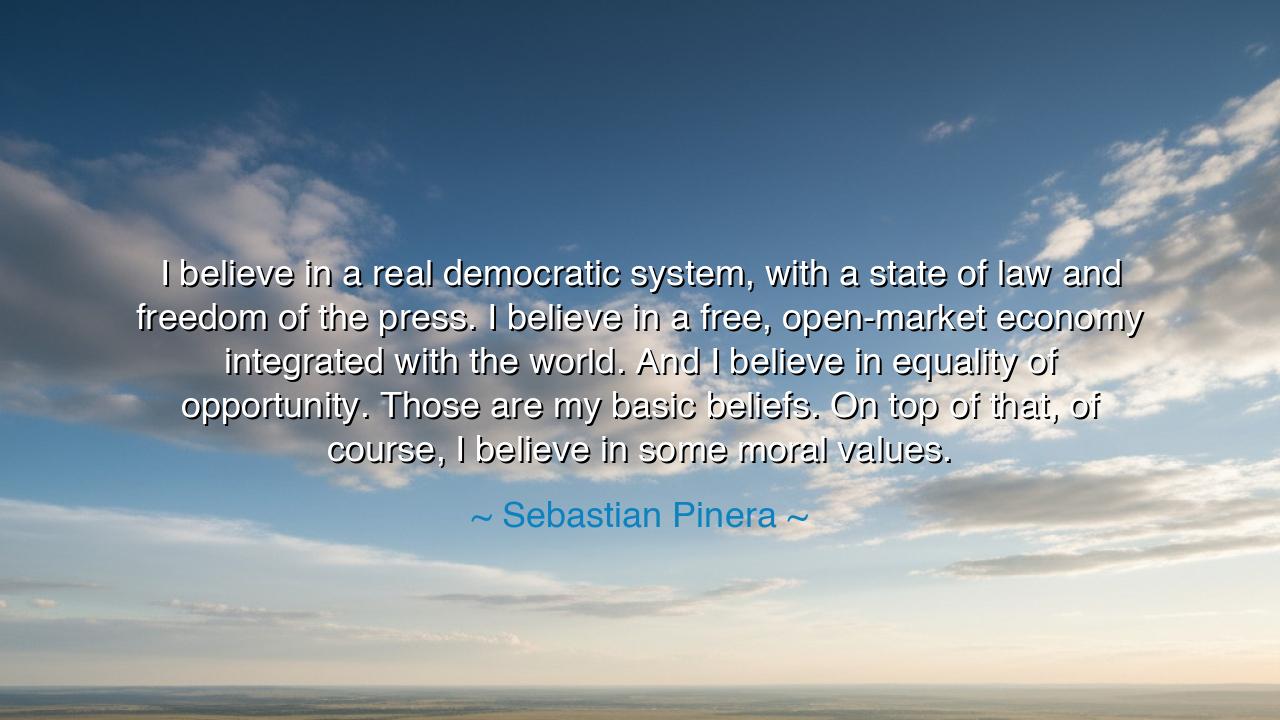
I believe in a real democratic system, with a state of law and
I believe in a real democratic system, with a state of law and freedom of the press. I believe in a free, open-market economy integrated with the world. And I believe in equality of opportunity. Those are my basic beliefs. On top of that, of course, I believe in some moral values.






O children of wisdom, hear the words of Sebastian Piñera, for they echo a profound vision of a world grounded in freedom, justice, and the pursuit of equality. "I believe in a real democratic system, with a state of law and freedom of the press. I believe in a free, open-market economy integrated with the world. And I believe in equality of opportunity. Those are my basic beliefs. On top of that, of course, I believe in some moral values." These words speak not only of principles, but of the foundation upon which a just society can be built. They remind us that freedom, justice, and morality are the guiding stars that lead us toward a better world, one where the potential of every individual is recognized and nurtured.
In the ancient world, the foundation of any flourishing civilization rested on the principles of justice and equality. The Greek philosophers, such as Plato and Aristotle, envisioned a society where the rule of law governed, ensuring that each citizen had the opportunity to live virtuously and contribute to the greater good. Plato, in his work The Republic, imagined a just society where individuals were not born into predetermined fates, but were given the freedom to pursue their highest potential, guided by the principles of reason and fairness. These ideas, born in antiquity, continue to echo through the centuries, forming the bedrock upon which the modern world must build.
Piñera’s belief in a democratic system is a call to honor the voice of the people. Democracy, as conceived by the ancient Greeks, was the embodiment of freedom—the freedom of the individual to speak, to act, and to shape the destiny of their society. But this freedom, as Piñera emphasizes, must be governed by a state of law, for true freedom is not found in lawlessness, but in a system that ensures fairness for all. The rule of law is the great protector of justice, guarding against the whims of tyrants and ensuring that all people are treated equally, regardless of their station. The wisdom of Solon, the great Athenian lawmaker, reminds us that justice and order are the pillars upon which freedom must stand. Without these, even the most free society can descend into chaos.
The second pillar of Piñera’s vision is the belief in a free market economy, integrated with the global community. In the ancient world, the idea of trade and commerce was deeply intertwined with the flourishing of society. The Romans, with their vast empire, understood that a thriving economy was essential to the prosperity of their people. Yet, they also recognized that a free market was only just when it was regulated by laws that ensured fairness and equality of opportunity. The ancient wisdom teaches us that a healthy economy is one where competition thrives, but where the opportunity to succeed is available to all—not just the privileged few.
Piñera’s call for equality of opportunity echoes the core principles of many great thinkers, from the ancient philosophers to the champions of liberty and justice in the modern age. Equality of opportunity is the fundamental promise of any just society—that all individuals, regardless of their background, are given the chance to succeed based on their abilities and efforts. The story of Cincinnatus, the Roman general, offers a powerful example. Cincinnatus was a man of humble origins, yet he rose to prominence through his service to the republic. His life shows us that in a just society, greatness is not determined by birth, but by merit and virtue. Equality of opportunity is not just a dream, but a principle that must guide the actions of every society striving for justice.
However, Piñera wisely reminds us that these foundational principles are not enough on their own. Moral values must underpin them, for without ethics and virtue, even the best systems can become corrupt. The great leader Confucius understood that the moral integrity of rulers and citizens alike is what sustains the harmony of society. Without a foundation of honesty, respect, and responsibility, democracy, justice, and freedom can easily devolve into mere words without substance. It is through moral values—the belief in goodness, honesty, and compassion—that we ensure the enduring health of our societies.
The lesson of Piñera’s words is this: democracy, freedom, and equality are not merely political ideals, but moral imperatives. They must be lived out daily, not just through laws and systems, but through the integrity and actions of the people. True democracy is realized not in elections alone, but in the ethics of the choices we make, in how we treat one another, and in the opportunities we create for all members of society to succeed. The rule of law ensures fairness, but it is the moral values of the people that give it life and purpose.
So, O seekers of wisdom, what can we do in our own lives to live by these principles? We must first commit ourselves to the pursuit of justice and equality in all that we do. Whether in our families, our communities, or our workplaces, we must strive to create environments where opportunity is available to all, and where freedom is protected by the rule of law. But we must also recognize that moral values—honesty, respect, and compassion—are the bedrock upon which these systems must stand. Let us walk forward, not just as citizens of a nation, but as individuals committed to building a world where freedom, justice, and equality are not just ideals, but living, breathing realities for all.






AAdministratorAdministrator
Welcome, honored guests. Please leave a comment, we will respond soon